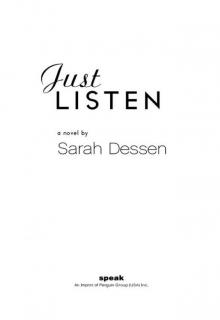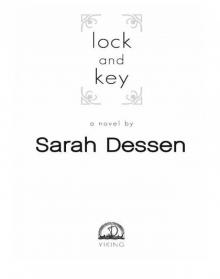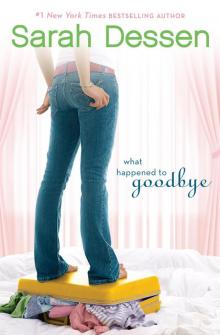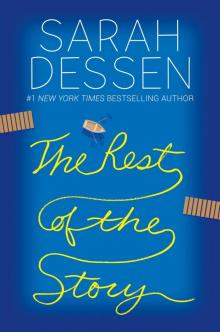- Home
- Sarah Dessen
Lock and Key Page 14
Lock and Key Read online
Page 14
“Where’s Gervais?” I asked.
“Doctor’s appointment,” Nate said.
I nodded, then I settled into my seat to enjoy the ride. My relief must have been palpable, because a moment later Nate said, “You know, he’s not so bad.”
“Are you joking?” I asked him.
“I mean,” he said, “I’ll admit he’s not the easiest person to be around.”
“Please.” I rolled my eyes. “He’s horrible.”
“Come on.”
“He stinks,” I said, holding up a finger. Then, adding another, I said, “And he’s rude. And his burps could wake the dead. And if he says one more thing about my books or my classes I’m going to—”
It was at about this point that I realized Nate was looking at me like I was crazy. So I shut up, and we just drove in silence.
“You know,” he said after a moment, “it’s a shame you feel that way. Because I think he likes you.”
I just looked at him. “Did you not hear him tell me I was fat the other day?”
“He didn’t say you were fat,” Nate replied. “He said you looked a little rotund.”
“How is that different?”
“You know,” he said, “I think you’re forgetting Gervais is twelve.”
“I assure you I am not.”
“And,” he continued, “boys at twelve aren’t exactly slick with the ladies.”
“‘Slick with the ladies’?” I said. “Are you twelve?”
He switched lanes, then slowed for a light. “He teases you,” he said slowly, as if I was stupid, “because he likes you.”
“Gervais does not like me,” I said, louder this time.
“Whatever.” The light changed. “But he never talked to Heather when she rode with us.”
“He didn’t?”
“Nope. He just sat back there, passing gas, without comment. ”
“Nice,” I said.
“It really was.” Nate downshifted as we slowed for a red light. “All I’m saying is that maybe he just wants to be friends but doesn’t exactly know how to do it. So he says you smell like trees or calls you rotund. That’s what kids do.”
I rolled my eyes, looking out the window. “Why,” I said, “would Gervais want to be friends with me?”
“Why wouldn’t he?”
“Because I’m not a friendly person?” I said.
“You’re not?”
“Are you saying you think I am?”
“I wouldn’t say you’re unfriendly.”
“I would,” I said.
“Really.”
I nodded.
“Huh. Interesting.”
The light changed, and we moved forward.
“Interesting,” I said, “meaning what?”
He shrugged, switching lanes. “Just that I don’t see you that way. I mean, you’re reserved, maybe. Guarded, definitely. But not unfriendly.”
“Maybe you just don’t know me,” I said.
“Maybe,” he agreed. “But unfriendly is usually one of those things you pick up on right away. You know, like B.O. There’s no hiding it if it’s there.”
I considered this as we approached another light. “So when we met that first night,” I said, “by the fence, you thought I was friendly?”
“I didn’t think you weren’t,” he said.
“I wasn’t very nice to you.”
“You were jumping a fence. I didn’t take it personally.”
“I didn’t even thank you for covering for me.”
“So? ”
“So I should have. Or at least not been such a bitch to you the next day.”
Nate shrugged, putting on his blinker. “It’s not a big deal.”
“It is, though,” I said. “You don’t have to be so nice to everyone, you know.”
“Ah,” he said, “but that’s the thing. I do. I’m compulsively friendly.”
Of course he was. And I’d noticed it first thing that night by the fence, because it, too, was something you couldn’t hide. Maybe I could have tried to explain myself more to Nate, that there was a reason I was this way, but he was already reaching forward, turning on the radio and flipping to WCOM, the local community station he listened to in the mornings. The DJ, some girl named Annabel, was announcing the time and temperature. Then she put on a song, something peppy with a bouncy beat. Nate turned it up, and we let it play all the way to school.
When we got out of the car, we walked together to the green, and then I peeled off to my locker, just like always, while he headed to the academic building. After I’d stuffed in a few books and taken out a couple of others, I shut the door, hoisting my bag back over my shoulder. Across the green, I could see Nate approaching his first-period class. Jake Bristol and two other guys were standing around outside. As he walked up, Jake reached out a hand for a high five, while the other two stepped back, waving him through. I was late myself, with other things to think about. But I stayed there and watched as Nate laughed and stepped through the door, and they all fell in, following along behind him, before I turned and walked away.
“All right, people,” Ms. Conyers said, clapping her hands. “Let’s get serious. You’ve got fifteen minutes. Start asking questions.”
The room got noisy, then noisier, as people left their seats and began to move around the room, notebooks in hand. After slogging my way through an extensive test on David Copperfield (ten IDs, two essays), all I wanted to do was collapse. Instead, to get us started on our “oral definition” projects, we were supposed to interview our classmates, getting their opinions on what our terms meant. This was good; I figured I needed all the help I could get, considering the way I defined my own family kept changing.
It had been almost two weeks since I’d come to Cora’s, and I was slowly getting adjusted. It wasn’t like things were perfect, but we had fallen into a routine, as well as an understanding. For my part, I’d accepted that leaving, at least right now, was not in my best interest. So I’d unpacked my bag, finally unloading my few possessions into the big, empty drawers and closet. I wasn’t ready to spread out farther into the house itself—I took my backpack upstairs with me as soon as I came home and stood by the dryer as my clothes finished, then folded them right away. It was a big place. God only knew how much could get lost there.
It was weird to be living in such sudden largess, especially after the yellow house. Instead of stretching a pack of pasta over a few days and scraping together change for groceries, I had access to a fully packed pantry, as well as a freezer stocked with just about every entrée imaginable. And that wasn’t even counting the “pocket money” Jamie was always trying to give me: twenty bucks for lunch here, another forty in case I needed school supplies there. Maybe someone else would have accepted all this easily, but I was still so wary, unsure of what would be expected of me in return, that at first I refused it. Over time, though, he wore me down and I gave in, although spending it was another matter entirely. I just felt better with it stashed away. After all, you never knew when something, or everything, might change.
Cora had compromised, as well. After much discussion—and some helpful lobbying from Jamie—it was decided I could work for Harriet through the holidays, at which point we’d “reconvene on the subject” and “evaluate its impact on my grades and school performance.” As part of the deal, I also had to agree to attend at least one therapy session, an idea I was not at all crazy about. I needed the money, though, so I’d bitten my tongue and acquiesced. Then we’d reached across the kitchen island, shaking on it, her hand small and cool, her strong grip surprising me more than it probably should have.
I’d been thinking about my mother a lot, even more than when she’d first left, which was weird. Like it took a while to really miss her, or let myself do so. Sometimes at night, I dreamed about her; afterward, I always woke up with the feeling that she’d just passed through the room, convinced I could smell lingering smoke or her perfume in the air. Other times, when I was half asleep,
I was sure I could feel her sitting on the side of my bed, one hand stroking my hair, the way she’d sometimes done late at night or early in the morning. Back then, I’d always been irritated, wishing she’d go to sleep herself or leave me alone. Now, even when my conscious mind told me it was just a dream, I remained still, wanting it to last.
When I woke up, I always tried to keep this image in my head, but it never stayed. Instead, there was only how she’d looked the last time I’d seen her, the day before she’d left. I’d come home from school to find her both awake and alone, for once. By then, things hadn’t been good for a while, and I’d expected her to look bleary, the way she always did after a few beers, or sad or annoyed. But instead, as she turned her head, her expression had been one of surprise, and I remembered thinking maybe she’d forgotten about me, or hadn’t been expecting me to return. Like it was me who was leaving, and I just didn’t know it yet.
In daylight, I was more factual, wondering if she’d made it to Florida, or if she was still with Warner. Mostly, though, I wondered if she had tried to call the yellow house, made any effort to try and locate me. I wasn’t sure I even wanted to talk to her or see her, nor did I know if I ever would. But it was important to simply be sought, even if you didn’t ever want to be found.
What is family? I’d written in my notebook that first day, and as I opened it up now I saw the rest of the page was blank, except for the definition I’d gotten from the dictionary: a set of relations, esp. parents and children. Eight words, and one was an abbreviation. If only it was really that easy.
Now Ms. Conyers called out for everyone to get to work, so I turned to Olivia, figuring I’d hit her up first. She hardly looked like she was in the mood for conversation, though, sitting slumped in her chair. Her eyes were red, a tissue clutched in one hand as she pulled the Jackson High letter jacket she always wore more tightly around herself.
“Remember,” Ms. Conyers was saying, “you’re not just asking what your term means literally, but what it means to the person you’re speaking with. Don’t be afraid to get personal.”
Considering Olivia was hardly open on a good day, I decided maybe I should take a different tack. My only other option, though, was Heather Wainwright, on my other side, who was also looking around for someone to talk to, and I wasn’t sure I wanted to go there.
“Well? Are we doing this or not?”
I turned back to Olivia. She was still sitting facing forward, as if she hadn’t spoken at all. “Oh,” I said, then shot a pointed look at the tissue in her hand. In response, she crumpled it up smaller, tucking it down deeper between her fingers. “All right. What does family mean to you?”
She sighed, reaching up to rub her nose. All around us, I could hear people chattering, but she was silent. Finally she said, “Do you know Micah Sullivan?”
“Who? ”
“Micah Sullivan,” she repeated. “Senior? On the football team? Hangs out with Rob Dufresne?”
It wasn’t until I’d heard this last name that I realized she was talking about Jackson. Rob Dufresne had sat across from me in bio sophomore year. “Micah,” I said, trying to think. Already, my classmates at Jackson were a big blur, their faces all running together. “Is he really short?”
“No,” she snapped. I shrugged, picking up my pen. Then she said, “Okay, so he’s not as tall as some people.”
“Drives a blue truck?”
Now she looked at me. “Yeah,” she said slowly. “That’s him.”
“I know of him.”
“Did you ever see him with a girl? At school?”
I thought for another moment, but all I could see was Rob Dufresne going dead pale as we contemplated our frog dissection. “Not that I remember,” I said. “But like you said, it’s a big place.”
She considered this for a moment. Then, turning to face me, she said, “So you never saw him all over some field-hockey player, a blonde with a tattoo on her lower back. Minda or Marcy or something like that?”
I shook my head. She looked at me for a long moment, as if not sure whether to trust me, then faced forward again, pulling her jacket more tightly around her. “Family,” she announced. “They’re the people in your life you don’t get to pick. The ones that are given to you, as opposed to those you get to choose.”
Since my mind was still on Micah and the field-hockey player, I had to scramble to write this down. “Okay,” I said. “What else?”
“You’re bound to them by blood,” she continued, her voice flat. “Which, you know, gives you that much more in common. Diseases, genetics, hair, and eye color. It’s like, they’re part of your blueprint. If something’s wrong with you, you can usually trace it back to them.”
I nodded and kept writing.
“But,” she said, “even though you’re stuck with them, at the same time, they’re also stuck with you. So that’s why they always get the front rows at christenings and funerals. Because they’re the ones that are there, you know, from the beginning to the end. Like it or not.”
Like it or not, I wrote. Then I looked at these words and all the others I’d scribbled down. It wasn’t much. But it was a start. “Okay,” I said. “Let’s do yours.”
Just then, though, the bell rang, triggering the usual cacophony of chairs being banged around, backpacks zipping, and voices rising. Ms. Conyers was saying something about having at least four definitions by the next day, not that I could really hear her over all the noise. Olivia had already grabbed her phone, flipping it open and calling someone on speed dial. As I put my notebook away, I watched her stuff the tissue in her pocket, then run a hand over her braids as she got to her feet.
“It’s Melissa,” I told her as she turned to walk away.
She stopped, then looked at me, slowly lowering her phone from her ear. “What?”
“The blonde with the back tattoo. Her name is Melissa West,” I said, picking up my bag. “She’s a sophomore, a total skank. And she plays soccer, not field hockey.”
People were moving past us now, en route to the door, but Olivia stayed where she was, not even seeming to notice as Heather Wainwright passed by, glancing at her red eyes before moving on.
“Melissa West,” she repeated.
I nodded.
“Thanks.”
“You’re welcome,” I told her. Then she put her phone back to her ear slowly, and walked away.
When I came out of school that afternoon after final bell, Jamie was waiting for me.
He was leaning against his car, which was parked right outside the main entrance, his arms folded over his chest. As soon as I saw him, I stopped walking, hanging back as people streamed past me on either side, talking and laughing. Maybe I was just being paranoid, but the last time someone had showed up unexpectedly for me at school, it hadn’t been to deliver good news.
In fact, it wasn’t until after I’d begun to mentally list the various offenses for which I could be busted that I realized there really weren’t any. All I’d done lately was go to school, go to work, and study. I hadn’t even been out on a weekend night. Still, I stayed where I was, hesitant out of force of habit or something else, until the crowd cleared and he spotted me.
“Hey,” he called out, raising his hand. I waved back, then pulled my bag more tightly over my shoulder as I started toward him. “You working today?”
I shook my head. “No.”
“Good. I need to talk to you about something.”
He stepped away from the car, pulling the passenger door open for me. Once in, I forced myself to take a breath as I watched him round the front bumper, then get in and join me. He didn’t crank the engine, though, just sat there instead.
Suddenly, it hit me. He was going to tell me I had to leave. Of course. The very minute I allowed myself to relax, they would decide they’d had enough of me. Even worse, as I thought this, I felt my breath catch, suddenly realizing how much I didn’t want it to happen.
“The thing is . . .” Jamie said, and now I could hear my
heart in my ears. “It’s about college.”
This last word—college—landed in my ears with a clunk. It was like he’d said Minnesota or fried chicken, that unexpected. “College,” I repeated.
“You are a senior,” he said as I sat there, still blinking, trying to decide if I should be relieved or more nervous. “And while you haven’t exactly had the best semester—not your fault, of course—you did take the SATs last year, and your scores weren’t bad. I was just in talking to the guidance office. Even though it’s already November, they think that if we really hustle, we can still make the application deadlines.”
“You went to the guidance office?” I asked.
“Yeah,” he said. I must have looked surprised, because then he added, “I know, I know. This is more Cora’s department. But she’s in court all week, and besides, we decided that maybe . . .”
I glanced over at him as he trailed off, leaving this unfinished. “You decided maybe what?”
He looked embarrassed. “That it was better for me to bring this up with you. You know, since Cor was kind of tough on you about your job at first, and the therapy thing. She’s tired of being the bad guy.”
An image of a cartoon character twirling a mustache as they tied someone to the train tracks immediately popped into my head. “Look,” I said, “school isn’t really part of my plans.”
“Why not?”
I probably should have had an answer to this, but the truth was that I’d never actually been asked it before. Everyone else assumed the same thing that I had from day one: girls like me just didn’t go further than high school, if they even got that far. “It’s just . . .” I said, stalling. “It’s not really been a priority.”
Jamie nodded slowly. “It’s not too late, though.”
“I think it is.”
“But if it isn’t?” he asked. “Look, Ruby. I get that this is your choice. But the thing is, the spring is a long way away. A lot could change between now and then. Even your mind.”
I didn’t say anything. The student parking lot was almost empty now, except for a couple of girls with field-hockey sticks and duffel bags sitting on the curb.
“How’s this,” he said. “Just make a deal with me and agree to apply. That way, you’re not ruling anything out. Come spring, you still decide what happens next. You just have more options.”

 Just Listen
Just Listen Along for the Ride
Along for the Ride This Lullaby
This Lullaby Once and for All
Once and for All Lock and Key
Lock and Key The Truth About Forever
The Truth About Forever Someone Like You
Someone Like You What Happened to Goodbye
What Happened to Goodbye Dreamland
Dreamland Keeping the Moon
Keeping the Moon The Rest of the Story
The Rest of the Story The Moon and More
The Moon and More What Happens to Goodbye
What Happens to Goodbye